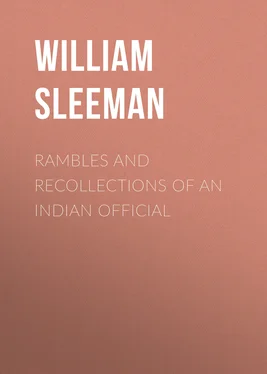William Sleeman - Rambles and Recollections of an Indian Official
Здесь есть возможность читать онлайн «William Sleeman - Rambles and Recollections of an Indian Official» — ознакомительный отрывок электронной книги совершенно бесплатно, а после прочтения отрывка купить полную версию. В некоторых случаях можно слушать аудио, скачать через торрент в формате fb2 и присутствует краткое содержание. Жанр: Путешествия и география, История, foreign_edu, foreign_antique, foreign_prose, на английском языке. Описание произведения, (предисловие) а так же отзывы посетителей доступны на портале библиотеки ЛибКат.
- Название:Rambles and Recollections of an Indian Official
- Автор:
- Жанр:
- Год:неизвестен
- ISBN:нет данных
- Рейтинг книги:4 / 5. Голосов: 1
-
Избранное:Добавить в избранное
- Отзывы:
-
Ваша оценка:
- 80
- 1
- 2
- 3
- 4
- 5
Rambles and Recollections of an Indian Official: краткое содержание, описание и аннотация
Предлагаем к чтению аннотацию, описание, краткое содержание или предисловие (зависит от того, что написал сам автор книги «Rambles and Recollections of an Indian Official»). Если вы не нашли необходимую информацию о книге — напишите в комментариях, мы постараемся отыскать её.
Rambles and Recollections of an Indian Official — читать онлайн ознакомительный отрывок
Ниже представлен текст книги, разбитый по страницам. Система сохранения места последней прочитанной страницы, позволяет с удобством читать онлайн бесплатно книгу «Rambles and Recollections of an Indian Official», без необходимости каждый раз заново искать на чём Вы остановились. Поставьте закладку, и сможете в любой момент перейти на страницу, на которой закончили чтение.
Интервал:
Закладка:
CHAPTER 10
The officers of the 29th had found game so plentiful, and the weather so fine, that they came on with us as far as Jaberā, where we had the pleasure of their society on the evening of the 24th, and left them on the morning of the 25th. 128 128 November, 1835.
A great many of my native friends, from among the native landholders and merchants of the country, flocked to our camp at every stage to pay their respects, and bid me farewell, for they never expected to see me back among them again. They generally came out a mile or two to meet and escort us to our tents; and much do I fear that my poor boy will never again, in any part of the world, have the blessings of Heaven so fervently invoked upon him by so many worthy and respectable men as met us at every stage on our way from Jubbulpore. I am much attached to the agricultural classes of India generally, and I have found among them some of the best men I have ever known. The peasantry in India have generally very good manners, and are exceedingly intelligent, from having so much more leisure and unreserved and easy intercourse with those above them. The constant habit of meeting and discussing subjects connected with their own interests, in their own fields, and 'under their own fig-trees', with their landlords and Government functionaries of all kinds and degrees, prevents their ever feeling or appearing impudent or obtrusive; though it certainly tends to give them stentorian voices, that often startle us when they come into our houses to discuss the same points with us.
Nine-tenths of the immediate cultivators of the soil in India are little farmers, who hold a lease for one or more years, as the case may be, of their lands, which they cultivate with their own stock. One of these cultivators, with a good plough and bullocks, and a good character, can always get good land on moderate terms from holders of villages. 129 129 This observation does not hold good in densely populated tracts, which are now numerous.
Those cultivators are, I think, the best, who learn to depend upon their stock and character for favourable terms, hold themselves free to change their holdings when their leases expire, and pretend not to any hereditary right in the soil. The lands are, I think, best cultivated, and the society best constituted in India, where the holders of estates of villages have a feeling of permanent interest in them, an assurance of an hereditary right of property which is liable only to the payment of a moderate Government demand, descends undivided by the law of primogeniture, and is unaffected by the common law, which prescribes the equal subdivision among children of landed as well as other private property, among the Hindoos and Muhammadans; and where the immediate cultivators hold the lands they till by no other law than that of common specific contract.
When I speak of holders of villages, I mean the holders of lands that belong to villages. The whole face of India is parcelled out into estates of villages. 130 130 These 'estates of villages' are known by the Persian name of 'mauza'. The topographical division of the country into 'mauzas', which may be also translated by the terms 'townlands' or 'townships', has developed spontaneously. Some 'mauzas' are uninhabited, and are cultivated by the residents of neighbouring villages.
The village communities are composed of those who hold and cultivate the land, the established village servants, priest, blacksmith, carpenter, accountant, washerman, basket-maker (whose wife is ex officio the midwife of the little village community), potter, watchman, barber, shoemaker, &c., &c. 131 131 In some parts of Central and Southern India, the 'Gārpagrī', who charms away hail-storms from the crops, and 'Bhūmkā', who charms away tigers from the people and their cattle, are added to the number of village servants, [W. H .S.] 'In many parts of Berār and Mālwa every village has its "bhūmkā", whose office it is to charm the tigers; and its "gārpagrī", whose duty it is to keep off the hail-storms. They are part of the village servants, and paid by the village community, After a severe hail-storm took place in the district of Narsinghpur, of which I had the civil charge in 1823, the office of "gārpagrī" was restored to several villages in which it had ceased for several generations. They are all Brahmans, and take advantage of such calamities to impress the people with an opinion of their usefulness. The "bhūmkās" are all Gōnds, or people of the woods, who worship their own Lares and Penates' (Ramaseeana , Introduction, p. 13. note).
To these may be added the little banker, or agricultural capitalist, the shopkeeper, the brazier, the confectioner, the ironmonger, the weaver, the dyer, the astronomer or astrologer, who points out to the people the lucky day for every earthly undertaking, and the prescribed times for all religious ceremonies and observances. In some villages the whole of the lands are parcelled out among cultivating proprietors, and are liable to eternal subdivisions by the law of inheritance, which gives to each son the same share. In others, the whole of the lands are parcelled out among cultivators, who hold them on a specific lease for limited periods from a proprietor who holds the whole collectively under Government, at a rate of rent fixed either permanently or for limited periods. These are the two extremes. There are but few villages in which all the cultivators are considered as proprietors—at least but few in our Nerbudda territories; and these will almost invariably be found of a caste of Brahmans or a caste of Rājpūts, descended from a common ancestor, to whom the estate was originally given in rent-free tenure, or at a quit-rent, by the existing Government for his prayers as a priest, or his services as a soldier. Subsequent Governments, which resumed unceremoniously the estates of others, were deterred from resuming these by a dread of the curses of the one and the swords of the other. 132 132 Very often the Government of the country know nothing of these tenures; the local authorities allowed them to continue as a perquisite of their own. The holders were willing to pay them a good share of the rent, assured that they would be resumed if reported by the local authorities to the Government. These authorities consented to take a moderate share of the rent, assured that they should get little or nothing if the lands were resumed. [W. H. S.] 'Rent' here means 'land-revenue'. Of course, under modern British administration the particulars of all tenures are known and recorded in great detail,
Such communities of cultivating proprietors are of two kinds: those among whom the lands are parcelled out, each member holding his share as a distinct estate, and being individually responsible for the payment of the share of the Government demand assessed upon it; and those among whom the lands are not parcelled out, but the profits divided as among copartners of an estate held jointly. They, in either case, nominate one of their members to collect and pay the Government demand; or Government appoints a man for this duty, either as a salaried servant or a lessee, with authority to levy from the cultivating proprietors a certain sum over and above what is demandable from him.
The communities in which the cultivators are considered merely as leaseholders are far more numerous; indeed, the greater part of the village communities in this part of India are of this description; and, where the communities are of a mixed character, the cultivating proprietors are considered to have merely a right of occupancy, and are liable to have their lands assessed at the same rate as those held on a mere lease tenure. In all parts of India the cultivating proprietors in such mixed communities are similarly situated; they are liable to be assessed at the same rate as others holding the same sort of lands, and often pay a higher rate, with which others are not encumbered. But this is not general; it is as much the interest of the proprietor to have good cultivating tenants as it is that of the tenants to have good proprietors; and it is felt to be the interest of both to adjust their terms amicably among themselves, without a reference to a third and superior party, which is always costly and commonly ruinous. 133 133 Since the author wrote these remarks the legal position of cultivating proprietors and tenants has been largely modified by the pressure of population and a long course of legislation. The Rent Acts, which began with Act x of 1859, are now numerous, and have been accompanied by a series of Land Revenue Acts, and many collateral enactments. All the problems of the Irish land question are familiar topics to the Anglo-Indian courts and legislatures.
Интервал:
Закладка:
Похожие книги на «Rambles and Recollections of an Indian Official»
Представляем Вашему вниманию похожие книги на «Rambles and Recollections of an Indian Official» списком для выбора. Мы отобрали схожую по названию и смыслу литературу в надежде предоставить читателям больше вариантов отыскать новые, интересные, ещё непрочитанные произведения.
Обсуждение, отзывы о книге «Rambles and Recollections of an Indian Official» и просто собственные мнения читателей. Оставьте ваши комментарии, напишите, что Вы думаете о произведении, его смысле или главных героях. Укажите что конкретно понравилось, а что нет, и почему Вы так считаете.












